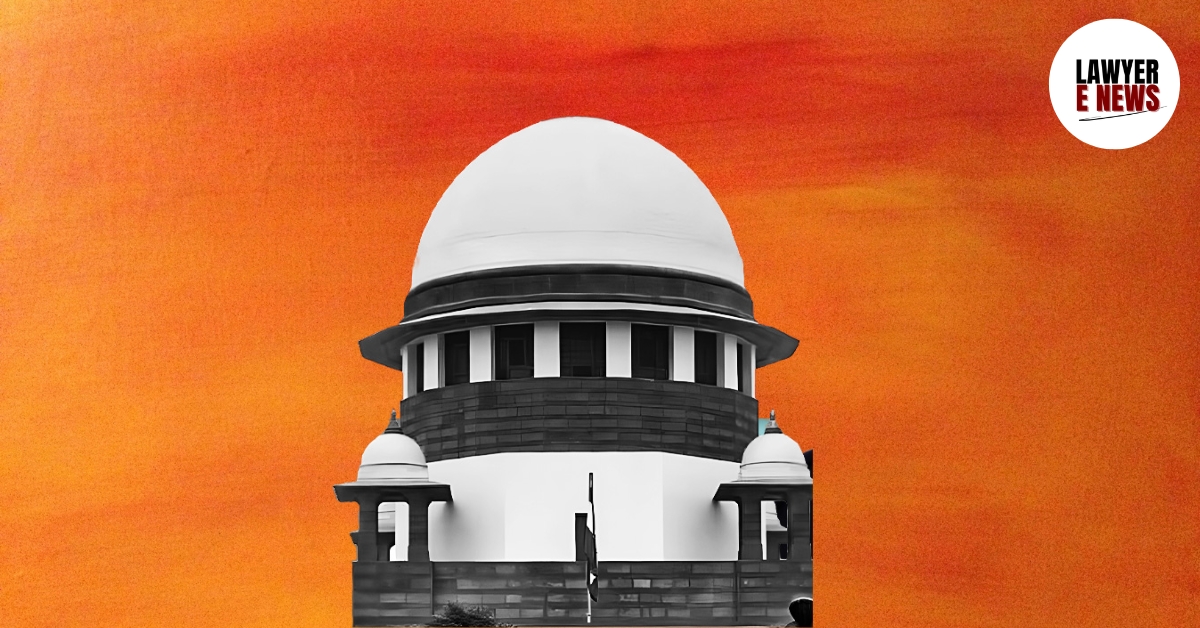-
by Admin
17 February 2026 4:27 AM



“When a substantial tract of industrial land is allocated without a competitive process, it raises critical questions about adherence to public trust and transparency”, In a significant verdict Supreme Court of India affirmed the cancellation of a 125-acre land allotment made in 2003 to a charitable trust. The Court declared the allotment process flawed, upheld the cancellation by the Uttar Pradesh State Industrial Development Corporation (UPSIDC), and simultaneously quashed a subsequent re-allotment to a private company, calling it “contrary to public policy.”
The judgment, authored by Justice Surya Kant, emphasized the importance of procedural fairness, fiscal responsibility, and adherence to the Public Trust Doctrine in the distribution of public resources.
“UPSIDC was not at fault; the Trust failed in fulfilling even basic obligations under the allotment terms”
The dispute originated from a 2003 allotment of 125 acres of land in Utelwa Industrial Area, Sultanpur, to Kamla Nehru Memorial Trust (KNMT) for floriculture. Although the allotment letter laid down a clear payment schedule and conditions for lease execution, KNMT defaulted repeatedly and, instead of complying, sought repeated extensions and waivers.
The Court noted:
“KNMT failed to fulfil its obligations, particularly regarding the timely submission of documents required for executing the lease deed. The foundation upon which KNMT forges its argument of frustration thus crumbles.”
KNMT had claimed that UPSIDC frustrated the contract by failing to demarcate the land or hand over possession due to alleged encroachments. The Court found these contentions “ex-facie an afterthought,” noting that the demarcation was done in March 2005 and acknowledged by KNMT itself.
“A legal notice is not a matter of form but substance – the Trust was well aware it was in default”
Rejecting the procedural challenge raised by KNMT regarding the absence of mandatory legal notices under Clause 3.04(vii) of the UPSIDC Manual, the Court held that the letters dated 14.12.2004, 14.12.2005, and 13.11.2006 sufficiently met the criteria of legal notices.
The Bench elaborated:
“It is beyond our comprehension as to what prejudice has really been caused to KNMT merely because these notices are not captioned as legal notices.”
“The communication in toto must be unambiguous and should not mislead or suppress material information… If the communications are juxtaposed with the essential ingredients of a legal notice, we have no reason to doubt that these constitute valid notices.”
The Court also rejected the contention that possession should have been granted before the lease deed execution, citing Clause 2.15 of the Manual, which clearly states that possession must follow lease registration.
“Public Trust Doctrine cannot be sacrificed at the altar of private convenience or privilege”
One of the most powerful parts of the judgment came when the Court invoked the Public Trust Doctrine to critique the original allotment process itself. The Bench observed:
“The allocation of 125 acres of industrial land to KNMT without a competitive process fundamentally violated the Doctrine, which demands proper procedure and substantive accountability in public resource allocation.”
Noting the striking “swiftness” with which the land was allotted to KNMT — within just two months — the Court expressed serious concern about whether such a large public asset had been distributed with adequate scrutiny.
“This betrays the fiduciary relationship between the State and its citizens.”
Re-allotment to Jagdishpur Paper Mills Also Set Aside
Interestingly, while affirming the cancellation of KNMT’s allotment, the Court also quashed the subsequent re-allotment to M/s Jagdishpur Paper Mills Ltd., observing that it too lacked transparency and was not based on any discernible public process.
“The actual allotment or any offer thereof made by UPSIDC in favour of M/s Jagdishpur Paper Mills Ltd is also declared to be illegal, contrary to public policy and is consequently annulled.”
Directions Issued for Future Allotments
The Court issued comprehensive directions to the State of Uttar Pradesh and UPSIDC:
“Any such allotment in the future be made in a transparent, non-discriminatory and fair manner by ensuring that such allotment process fetches maximum revenue and also achieves the larger public interest like industrial development priorities, environmental sustainability, and regional economic objectives.”
“The Subject Land shall also be allotted strictly in accordance with the procedure.”
In essence, the Supreme Court not only ruled against KNMT for being a chronic defaulter but also used the opportunity to set a precedent on how industrial land — a vital public resource — must be allocated with fairness and transparency. The judgment underlines that procedural adherence is not a formality but a constitutional imperative, especially when large tracts of land and public money are involved.
Date of Decision: 30 May 2025
